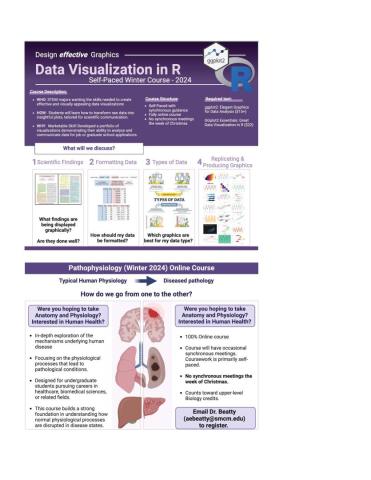Audience

Any students who are interested in taking a biology course over the winter term can register for either Pathophysiology or Data Visualization in R. While Pathophysiology may be more applicable to upper-level biology or other STEM students, Data Visualization in R is a widely used skill among professionals! I hope to see you there.
Please find the course posters attached, and the abbreviated course descriptions below. Email Dr. Beatty with questions or help registering.
Data Vis in R:
This course is designed to equip STEM majors with the skills needed to create effective and visually appealing data visualizations using R, focusing on the widely used ggplot2 package. The course provides a comprehensive introduction to data visualization principles, emphasizing their application in scientific research and data analysis. Students will learn how to transform raw data into insightful plots, tailored for scientific communication. Weekly live sessions will include interactive lectures, hands-on coding exercises, and group discussions. Asynchronous materials such as recorded lectures, coding walkthroughs, and practice assignments will be available for flexible learning. By the end of the course, students will have developed a portfolio of visualizations demonstrating their ability to analyze and communicate data in R.
Pathophysiology:
This course offers an in-depth exploration of the mechanisms underlying human diseases, focusing on the physiological processes that lead to pathological conditions. Designed for undergraduate students pursuing careers in healthcare, biomedical sciences, or related fields, this course builds a strong foundation in understanding how normal physiological processes are disrupted in disease states. Throughout the course, students will study the etiology, pathogenesis, and clinical manifestations of various disorders affecting major organ systems, including cardiovascular, respiratory, endocrine, and nervous systems. The curriculum emphasizes critical thinking and application of knowledge through the analysis of case studies, linking theoretical concepts to real-world clinical scenarios.
